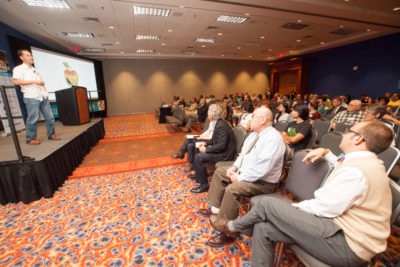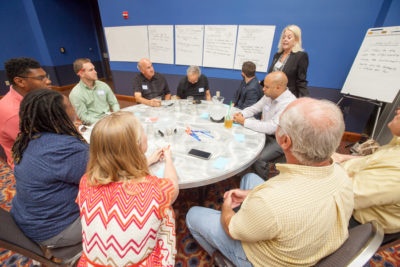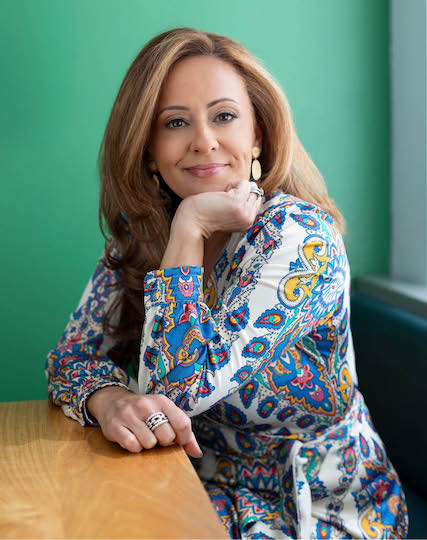This is Part 2 of 2 based on my recent SAS Talk with Kim podcast with Emie Michaud Weinstock of Reveled Up, a branding and event marketing boutique. A good chunk of our discussion focused on the importance of the speakers and/or facilitators, which is what dive into here. In Part 1 we go through the content and design of the events. And we've compiled a Top 10 Best Practices list.
Event Organizing: More Than Securing a Venue
I mentioned to Emie an experience I keep having at conferences where the content of the sessions is top-notch, but the presenters are not. And I imagine a lot of our everyday residents encounter the same thing. They read the catchy event title or tagline, see a big-name speaker and/or are promised that the experience will be fun, interactive and educational. Only to show up to hear someone read their PowerPoint.
She made a really good point that I bet often gets overlooked: the organizers,  presenters and participants are all key to achieving a lasting immersive event experience and that means grooming your speakers as much as getting the right venue. It might be easy to assume that someone – given their resume, affiliation or lengthy list of prior speaking engagements – will be the perfect fit. But we must remember that communicating in anyway particularly in front of a large audience is a skill that many people have not yet mastered. Being an expert on a topic does not necessarily make you an expert communicator of that topic.
presenters and participants are all key to achieving a lasting immersive event experience and that means grooming your speakers as much as getting the right venue. It might be easy to assume that someone – given their resume, affiliation or lengthy list of prior speaking engagements – will be the perfect fit. But we must remember that communicating in anyway particularly in front of a large audience is a skill that many people have not yet mastered. Being an expert on a topic does not necessarily make you an expert communicator of that topic.
Plus, even if a speaker has mastered how to speak to large crowds but they haven't mastered speaking in front of YOUR crowd and YOUR audience. If you have an intention or objective that you want your audience to walk away with - it’s probably specific to your organization. The speaker isn't going to know that, or s/he will have their own agenda/objectives. Part of what grooming a speaker does is get them on-brand for your event. It gets them speaking and relating to YOUR audience (the way you want them to) so that YOUR objectives for your audience are met.
That means as an event organizer, in addition to logistics planning, you have to nurture and prepare the event speakers. Your speakers should understand your objectives and intentions for holding the event. They should understand how their presentation fulfills that objective or goal. If one of the objectives of your event is to associate sustainability with fun and community interaction - your speaker needs to know that and incorporate a presentation that helps achieve that objective.
Facilitation Means Respect and Results
There are also events that are not large scale and are focused and smaller in order to obtain in-depth information from participants. Often the linchpin for success for this type of event -- especially where you are soliciting feedback on a project or proposal -- 
is a good facilitator. Emie underscored that you need someone who is trained to be open, fair, authentic and can foster a respectful dialogue. You want to ensure that facilitators are experienced enough to know not to ask leading questions and to make everyone feels invited to participate. It’s their job to make sure people don’t feel “shut up and shut out.”
These points really rang true for me given the current state of civil society in this country. Political polarization and hate have the potential to silence entire populations in our communities – or to turn an event into a one-sided discussion or shouting match. In many cases, particularly those with a controversial topic on the agenda, having a skilled facilitator in charge or at least on hand is essential.
5 Things to Look for in a Facilitator
1. Ability to listen closely and well. This means being able to pick up on what is being said beyond the actual words. This skill requires that a facilitator is savvy enough to listen and then take action based on what is being said, including asking good following questions and paying attention to who is -- and isn't -- speaking.
2. Ability to navigate a group and understand how to manage group dynamics. Knows how to set up guidelines with a group vs. for the group. Also able to ensure that all voices are heard and given equal weight.
3. Ability to ask open ended non-leading questions with as little bias as possible. Run through your content and objectives with them in advance and ask them to give you some sample questions based on your scenarios.
4. Well prepared. Does NOT come to your event with notes or a deck from another presentation thinking that they can just deliver the same material. The facilitator should understand your objectives for your attendees and tailor their presentation (if they are asked to give one) to those objectives.
5. Willing to do their homework. Has been willing to sit with you beforehand to discuss the event and your objectives. Be wary of any facilitator that seems to think that they know your audience better than you do.

